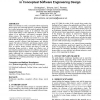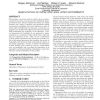135 search results - page 27 / 27 » Optimal control problem on insect pest populations |
GECCO
2010
Springer
13 years 5 months ago
2010
Springer
This paper takes an economic approach to derive an evolutionary learning model based entirely on the endogenous employment of genetic operators in the service of self-interested a...
GECCO
2005
Springer
13 years 10 months ago
2005
Springer
GP uses trees to represent chromosomes. The user defines the representation space by defining the set of functions and terminals to label the nodes in the trees, and GP searches t...
GECCO
2008
Springer
13 years 6 months ago
2008
Springer
While recent attempts to search a conceptual software engineering design search space with multi-objective evolutionary algorithms have yielded promising results, the practical ap...
GECCO
2007
Springer
13 years 11 months ago
2007
Springer
We attack the problem of user fatigue by using an interactive genetic algorithm to evolve user interfaces in the XUL interface definition language. The interactive genetic algori...
ATAL
2010
Springer
13 years 6 months ago
2010
Springer
We introduce a novel case study in which a group of miniaturized robots screen an environment for undesirable agents, and destroy them. Because miniaturized robots are usually end...


